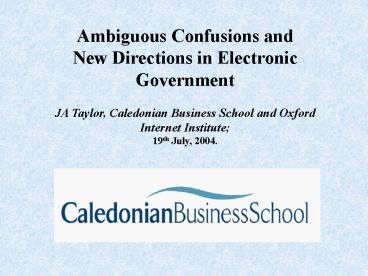Ambiguous Confusions and - PowerPoint PPT Presentation
1 / 11
Title:
Ambiguous Confusions and
Description:
'the use of technology to enhance access to and delivery of ... From provider-led to citizen-centric services. From universalism to CRM and personalised services ... – PowerPoint PPT presentation
Number of Views:39
Avg rating:3.0/5.0
Title: Ambiguous Confusions and
1
Ambiguous Confusions and New Directions in
Electronic Government JA Taylor, Caledonian
Business School and Oxford Internet Institute
19th July, 2004.
2
The E-Government Paradigm Policy Orthodoxy
- the use of technology to enhance access to and
delivery of government services to benefit
citizens, business partners and employees. It has
the power to create a new mode of public services
where all organisations deliver a modernised,
integrated and seamless service for their
citizens - From provider-led to citizen-centric services
- From universalism to CRM and personalised
services - From information provision to integrated on-line
transactions - From fat to lean cost/performance ratios.
3
The E-Government Paradigm An Uncritical Research
Orthodoxy
- The first step is to measure what can easily be
measuredThe second step is to disregard that
which cannot be measured or give it an arbitrary
quantitative value.The third step is to presume
that which cannot be measured easily is not
really very importantThe fourth step is to say
that what cannot be easily measured really does
not exist. - Positivist
- Measurement oriented
- Comparative/benchmarking focus
- Atheoretical
- De-contextualised
4
- Dominant Perspectives on Governance Networks
Markets or Hierarchies Markets - Governing without government
- Multi-level and horizontal governance
- The prospect is that hierarchical control will
be replaced by continuing processes of bargaining
among interested parties within most fields of
Public Admin Bogason et al, 1998
5
- Dominant Perspectives on Governance An emergent
revision? - Governance takes place in the shadow of
hierarchy Jessop, 2004 - The erosion of central power should not be
assumed Bache Flinders, 2004 - British society is marked by continuing patterns
of structured inequality - Marsh et al, 2003
- Camouflaged centralism and The Decline of the
Public - Marquand, 2004
6
New Directions in e-Government The Policy
Backdrop
- Perceived failure of e-government
- Continuing critique of management and
organisational failures in the public services - Low trust government, high trust alternatives
- Communitarianist thinking in HMG
- The democratic deficit v alternative political
engagement - CRM, personalisation and public service
improvement
7
New Directions in e-Government Getting closer to
the Third Sector
- Compacts between government and the Voluntary
Sector - Legal promise for the Voluntary Sector
Campaigning Charitable Status - Enhanced financial independence for the Voluntary
Sector Securing longer term funding Charity
Banks and Venture Philanthropy - Developing the ICT infrastructure of the
Voluntary Sector - Implementing the Electronic Mixed Economy
- CRM and Identity Management.
8
New Direction 1 The Electronic Mixed Economy
- Delivering e-government through voluntary and
private sector intermediaries - Exploiting information and knowledge joining up
services to the citizen customising/personalising
services for the citizen enhancing uptake - Data sharing for planning and implementing
e-services - Identity Management
- Intermediaries in a virtual policy environment
- partners of government?
- agents of the citizen?
- agents of the government?
9
New Direction 2 Customer Relations Management,
Personalisation and Identity Management
- CRM the idealised consumer/government
relationship in a low trust environment - Personalisation Orwell or Amazon?
- Identity Management affording ease of access
delivering differentiated services social
categorization, subjugation or citizenship?
10
New Direction 2 Customer Relations Management,
Personalisation and Identity Management
- Identification and third party authentication
- Layered citizenship
- Personalising the web MyVirginia
- Covert collection of personal data
- RFID
- Location based services
- Biometrics the Privium Smartcard
11
Critical e-Government in the Information Polity
- Informatisation as x-ray
- Information flows, resource dependencies and
power relationships - Information capabilities standardisation,
fitness for purpose controls - Information matching and sharing
- Informating the citizen
- Information domains and institutional life
- Information, accountability and legitimacy.































